From writing both professionally and creatively, I’ve learned that if you really want to turbo your skills, don’t just read. The trick is to interact with text. Actually engage it in some way that suits you. Copy it out by hand, sing it in the shower, dissect it in your margin notes, rewrite it in your voice and perform it for your cat—it doesn’t even matter which method you choose. Whenever I take what I read to the next level and interact, some kind of secret compounding is triggered. I look back three months later and have to admit, weirdly my writing got better. We absorb the consciousness of text on another level when we go to the trouble of engaging it.
This applies across domains, from painting to sculpture and anywhere I’ve tried it out. Drawing from the work of other artists is an age-old practice, but you can get more creative too. One day I remade a sculpture by Alberto Giacometti out of blu-tack and balsa wood, and it led to the idea that would become a one-and-a-half-story virtual-gothic sculpture on an abandoned airfield. But by far the most astonishing personal and creative change I’ve ever experienced kicked off when I began to engage my dreams.
Why not experiment a bit further afield, I’ve wondered, with a focus on the heart? And so this publication is having a heart season. My last essay looked at what happens when the heart is blocked, and how unblocking it changes lives. That’s not so easy, because Western culture is defiantly head-centric—at the expense of our hearts.
It wasn’t always like this. At some point in the past few thousand years, the site to which we attribute our cognition switched from our heart to our brain. The transition was long and messy. But the before and after states are clear.
For the ancient Egyptians, the heart was the center of thought, emotion, and soul. In their texts two words were used for the heart, often interchangeably: ib and haty. The heart-ib was a kind of internal, insubstantial, and invisible self; the heart-haty was the outer, visible, physical organ. The Egyptology scholar Teodor Lekov noted that “when the heart-ib is not present, the heart-haty is lacking.” In other words, for the Egyptians there was a real, inescapable relationship between the subtle heart-soul and gross heart-organ, and the health of each very much depended on the other. In contrast, modern medicine treats our sick hearts like replaceable, drugged-up pumps. I can’t help but wonder if this soul-sucking materialist impoverishment somehow contributes to the fact that heart disease is the leading cause of death in the US, to say nothing of the epidemic rates of depression, anxiety, and loneliness.
Ancient Chinese medicine relegated the brain to a mere storage closet role, while the heart ruled the body and organized the senses—to see clearly required the activity of the heart. Aristotle developed a cardio-centric philosophy, with the heart as the seat of thought, reason, and the soul. Even in medieval Europe, these higher functions of the heart were still expressed in devotional traditions that sprang up around the Sacred Heart of Jesus, and there remained a lingering, though perhaps fading, belief that the soul resided in the heart.
Nowadays, it’s dead obvious that thinking is a brain activity—so utterly obvious that I bet it’s a blind spot, and that future paradigm shifts will show that we’ve forgotten to account for a spectrum of experience essential to our nature.
I don’t believe one organ is meant to be a winner. Focusing on a ruler—either with the brain superior to the heart, or the heart superior to the brain—demotes the other, along with a mega-chunk of potential human flourishing. And such a one-sided stance ignores how inextricably, from the biological to the spiritual, the two really are connected. Wouldn’t it be better to have a heart and brain that fully, deeply, seamlessly work together?
Also, I have no idea how to do that.
A few years ago, as these questions began to percolate for me, I turned to the I Ching for guidance. If you’re unfamiliar with the I Ching, it’s the most famous of the ancient treatises from China, an extraordinary book of wisdom that’s been knocking around for ~3000 years. I searched the text of the Wilhelm-Baynes translation for mentions of the heart—there are 63 hits for heart, and 0 for the brain. These passages reflect a profoundly cardio-centric consciousness, with nuance and insight I’ve never found elsewhere.
And so for this post, episode number two of heart season, I’ve collected seven of my favorite heart quotes from the I Ching, and paired them with interactive musings below. Because I’d only say yes to more heart-clarity. And I haven’t found a better place to start than the I Ching.
Even with slender means, the sentiment of the heart can be expressed.
In my mid-20s, midway through grad school in sculpture, I remember sitting at the tiny desk in my room after a night out and staring at a blank computer screen. In a very confusing and contradictory way, I wished I could be a writer, but I also felt like I had nothing to say. That night I managed to write a paragraph in a password-protected Word file and promptly forgot the password. I wish I could give my tender, younger self the I Ching’s sage advice: In writing, just as in every love and every relationship, even with slender means, the sentiment of the heart can be expressed.
True kindness does not count upon nor ask about merit and gratitude but acts from inner necessity. And such a truly kind heart finds itself rewarded in being recognized, and thus the beneficent influence will spread unhindered.
Steve Martin said in his memoir, “Be so good they can’t ignore you.” Similarly, Phillip Seymour Hoffman said that if you show up for an audition and give it your all, no one will forget it—and when you scorch the dance floor like that, something is bound to happen. Both takes are surely true, but I also find them a bit dry, a bit sanitized. They imply that some standard of excellence is the only criteria at work. If an artist is great, the job is done.
We’ve forgotten the heart. Behind appearances, the qualities and actions of the heart drive the show. You know it when you see it. When you find a truly kind heart—one that acts from inner necessity, not the contortions of mimetic posturing—my god, is there anything more attractive in this world. Last week I spontaneously dm’ed a friend about how amazing this person I worked with is. I feel lighter each time I see them, their kindness is buoyant, additive, enhancing. And that aura, it just compels, it just wants to spread, you have to tell people about the fucking glorious little and big things a truly kind heart does. This isn’t woo—the heart is both an electromagnetic receiver and transmitter. When that channel is clear, the good ripples through us, and takes on a life of its own.
While man sees what is before his eyes, God looks into the heart. Therefore a simple sacrifice offered with real piety holds a greater blessing than an impressive service without warmth.
You know, I wonder how this applies to Instagram.
The heart thinks constantly. This cannot be changed, but the movements of the heart—that is, a man’s thoughts—should restrict themselves to the immediate situation. All thinking that goes beyond this only makes the heart sore.
Ok, at least now I have words for this experience. My heart-thinker gallops with embarrassing eagerness into wonderings about the future. And it only ever leads to a sore heart. Yesterday afternoon, aching again, I spoke to my brother, and his kindness gently brought me back to the present situation. Sometimes I can make that loop solo, sometimes I need the hug of another heart.
There are secret forces at work, leading together those who belong together. We must yield to this attraction; then we make no mistakes. Where inner relationships exist, no great preparations and formalities are necessary. People understand one another forthwith, just as the Divinity graciously accepts a small offering if it comes from the heart.
At age 19, I took a year off from college and waitressed at a diner. That was the year I decompressed from a major in physics and math, and made a slow-motion switch to studying art. In my spare time I haunted bookstores. On a shelf of indie recommendations, I found Book of Changes, a collection of interviews with punk rock musicians, filmmakers, artists and writers by Kristine McKenna. As it happens, the title is a reference to the I Ching. I dove into that book like a blissful, clear pool. It was the first time I’d read a spectrum of real-world creators—grizzled, iconoclastic underground types—in their own words. For years I gave copies of it as a gift to friends and family.
Decades after I’d become an artist, I moved to LA and mentioned how much I loved that book to a new friend. The friend said, oh I know Kristine, which astonished me, that out of the 7 billion souls on this planet the author of the book which had so impressed me would be just one easy degree of separation away. She introduced us, and Kristine contributed to an art project I had going. When Kristine came to my birthday dinner a year later, she surprised me with the gift of a long white vintage dress peppered with tiny red hearts. Only one book had laid itself on my heart in that way—and her gift felt like a tiny wink from the I Ching.
This has happened more times than I can count, on larger and smaller scales. Against the odds, we’re led to cross paths with kindred souls. As the I Ching says, secret forces are at work, leading together those who belong together. I believe we have free will; we can make of our connections what we choose. It’s never an excuse for tolerating crappy treatment. But when we wish to tune in, the affinities of the heart have a gravity of their own that I could swear alters space and time. They snake out from our hearts in long threads across the years. And when one begins—with even the smallest gesture, like pulling a book from a shelf—there’s no telling where that web may go.
The original impulses of the heart are always good, so that we may follow them confidently, assured of good fortune and achievement of our aims.
At 30, I was hit by a car while crossing the street. I’m still not sure if the big scar on my forehead came from getting my head smashed on the car’s windshield or the asphalt. Strangely, after the accident I finally began to write. Perhaps the blunt-force trauma of the encounter with my mortality made the act of writing seem not quite so scary. Perhaps with my priorities rejiggered, I heard the subtle call a little more clearly. Looking back, it had always been there. I just didn’t know how to consciously read the original impulses of my heart. And I didn’t even realize it was a skill I could be missing.
These are the quiet heart nudges, the pull or gravitational slide we experience toward new ideas, people, experiments and endeavors. You can tell they’re original because they pop up before the prefrontal cortex has a chance to intervene, so they often feel implausible, yet tingly with rightness. They’re easy to miss, because they don’t seem rational, practical or even beneficial. They just are. I just wanted to write. Now, when there’s a choice between an option that looks good on paper and an inexplicable heart nudge, I’ll bank on the latter every time.
A quiet, wordless, self-contained joy, desiring nothing from without and resting content with everything, remains free of all egotistic likes and dislikes. In this freedom lies good fortune, because it harbors the quiet security of a heart fortified within itself.
Heart-learning isn’t like chemistry class. The heart’s knowledge is different than everyday straight-up facts. Nobody knows the periodic table until a dude in corduroys bores you to tears in 7th grade. But the heart doesn’t need to be taught—somehow it already knows. Whatever bit of wisdom we’re told or read or hear, when it finally clicks, it wakes up a germ of potential we always possessed. There’s an aha that feels like coming home.
That quiet, wordless joy has come most often for me in art. At the end of college, I put together a book-length collection of photographs I’d taken over the past two years. A professor spent the afternoon with me, and we edited the hundred or so images into a cohesive flow. The resulting book mock-up was never published or shown. All the same, it gave me a heart-high that lasted weeks. It was a quiet feeling of rightness and satisfaction and contentment—just from having done the thing, just that it existed. I’ve felt it. And I bet you have too.
About a week ago, after most of this essay was written, I laid down to sleep, and as soon as I got still, I felt a constriction in my heart. A hardening of my chest. It was suddenly difficult to breathe. My lungs were trying to expand into what felt like a painful shell. I had a flush of panic and wondered if I really should be panic-ing. Then I relaxed, and let whatever it was be.
Somewhere in that letting go my chest loosened and expanded. I was filled and emptied by a flow of deep long rapid breaths. And it felt wonderful—marvelously open and clear, even euphoric, as if some rogue wave had crashed on the beach of my heart and now its foamy ebb tickled my innermost chest. For a moment I was permeated by a pale green-blue color as elusive and wide-open as the air. It felt like a gift.
I always expect growth to make my life smoother, more palatable and less weird. So far this has failed to occur.
After that experience I felt even more than before. At first, a surplus of exquisitely sharp, overwhelming pain. What the heck was going on, I asked myself and friends. Maybe a bunch of old emotive experience had been stuck in there. Or was it that another subtle shell had been pierced and shed, and now I felt my heart-space at 10x the previous intensity in the quickness of real time. I cried sending a simple thank you dm and fist-bumped heaven for an email with good news. Something unlocked in my daily writing practice and I tapped the energetic well with a new ease. My clarity got sharper too. Sometimes I felt the vibratory subtext, machinations, and unconscious motivations of people I spoke to and zoomed with, and that janky shit was cardiologically unbearable. There it all was, flip-flopping between a soup and a symphony—the constant thoughts, the original impulses of my heart.
This has been just one of many heart openings I’ve had over the past few years. It’ll take some growing into. But I shouldn’t be surprised. I was sincerely engaging with subtle matters of the heart. And my heart responded.
Such wonderful tips and notes came my way after episode one of heart season. The inimitable rec’d this collection from Bryan Doyle and I’m eagerly awaiting the package. Wendy Ortiz shared her work on the heart, history and metaphor and mentions some of his profound heart realizations here. Thanks also to and and
for such generous comments. Feels like there’s an underground world of heart-writers out there, and I’d love to hear of & from more.
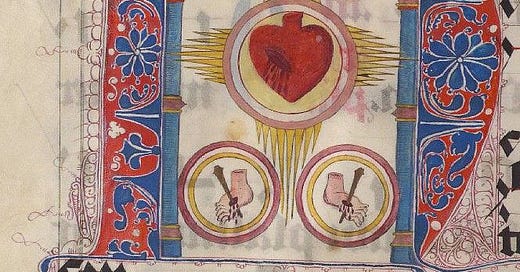


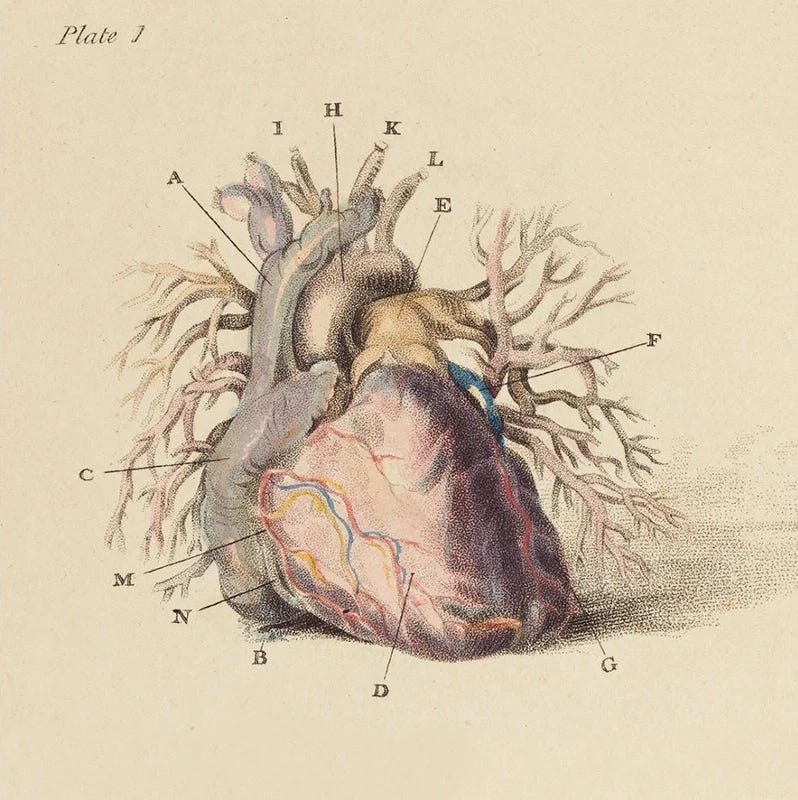
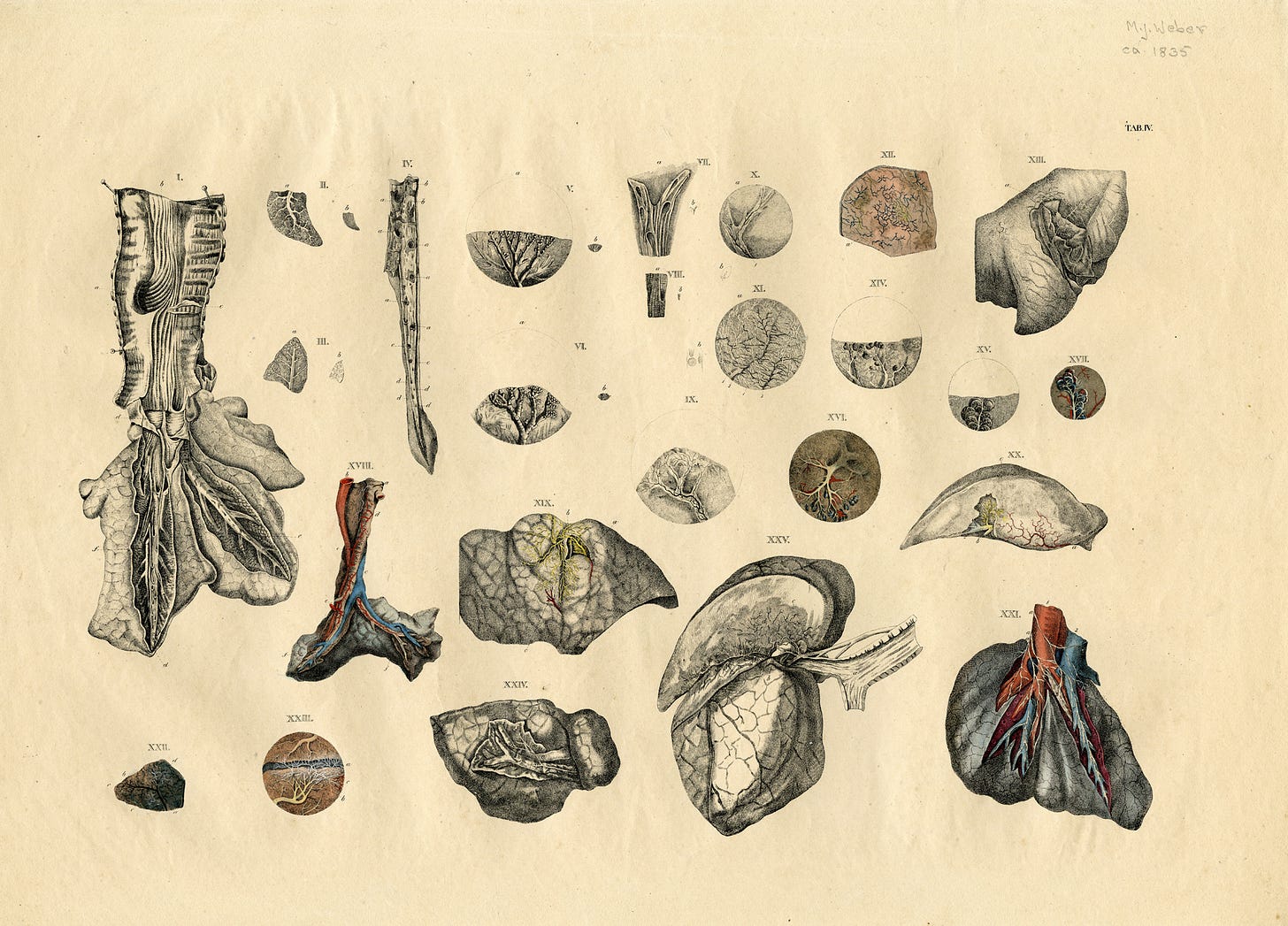
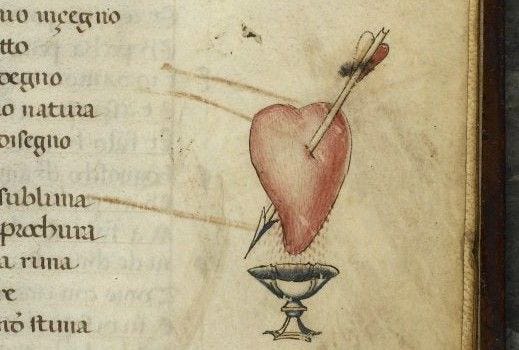
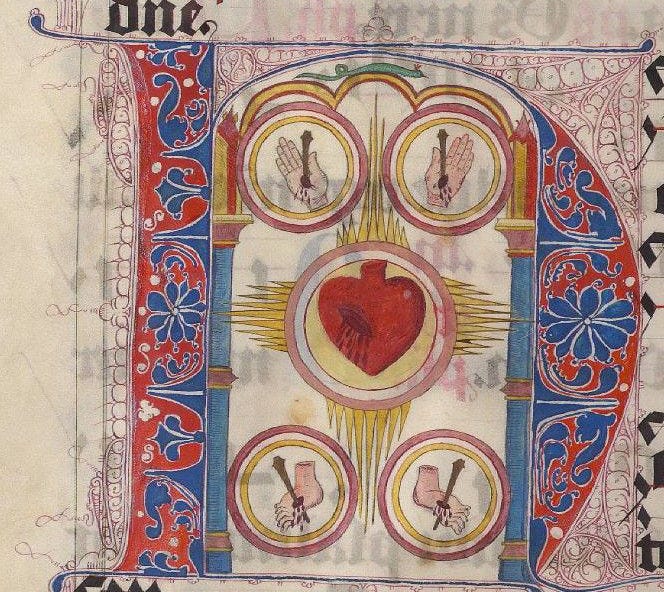
Some days, when I wake too early, I lay in bed and practice locating my heart. Often, I have to just feel it beat a while until I begin to notice the way its spreads warmth through my chest and down my limbs. It's a physical sensation...the ease of returning to that knowing, that home you describe. But its also a wholesale unblocking. Days when I can't sleep turn out to be the best ones, no doubt because they're heart-forward. Ideas move fluidly, come easily. Life feels less punchy and disjointed; certainly less marred by petty critiques, which so often plague me when I'm firing on intellect alone. I couldn't agree more that integrating these parts is a necessary next step for humanity. I am so glad for this gonzo dive. And I cannot wait for you to read Brian Doyle. He and the iChing share space on my bedroom shelf. I'm so happy I found your work. What a gift.
I felt my heart sing when you wrote of connections made between hearts. I know that sense of rightness. Beautifully and delicately crafted essay, Kristin.